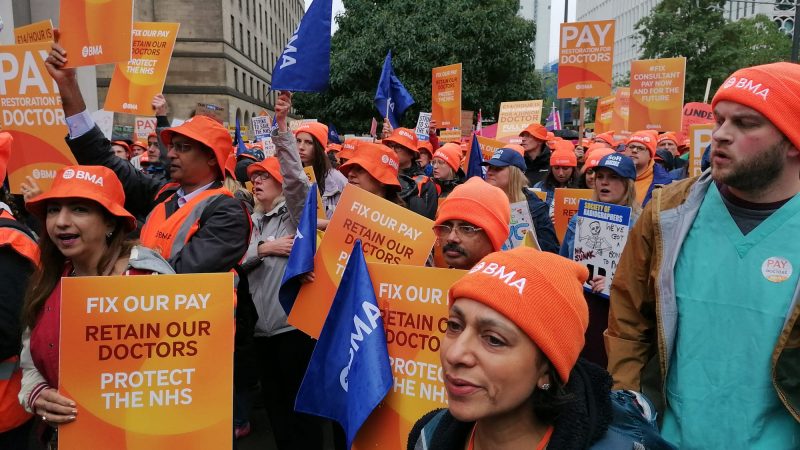"The medical workforce is burned-out, quietly quitting & feels totally undervalued after more than a decade of pay cuts."

NHS England has warned today that this week could see “one of the most difficult starts to the year ever” as junior doctors in England are set to enter the longest strike in NHS history on Wednesday.
The warning comes as covid, flu and staff sickness absence add to seasonal pressures on the NHS during one of the busiest periods for the healthcare system.
Junior doctors have been forced back onto the picket lines in their long-running dispute with the government for pay restoration, demanding a reverse to the 26% real terms pay cut they have seen since 2008/09.
From 7am on Wednesday 3 January, to 9am on 9 January junior doctors in England will take 114 continuous hours of industrial action, the longest in NHS history. The British Medical Association (BMA) continues to urge the government to provide a credible offer it can put to members, and end the strikes.
NHS National Medical Director Professor Sir Stephen Powis warned: “This January could be one of the most difficult starts to the year the NHS has ever faced.
“Six consecutive days of industrial action comes at one of our busiest periods – the action will not only have an enormous impact on planned care, but comes on top of a host of seasonal pressures such as covid, flu, and staff absences due to sickness – all of which is impacting on how patients flow through hospitals.”
The BMA has continued to emphasise that its door is open to a credible offer from the government which would end the strike action. The union is asking for a 35% pay rise to make up for their loss in earnings. Junior doctors in Scotland accepted a 12.4% pay increase for 2023/24.
Dr Robert Laurenson and Dr Vivek Trivedi, BMA junior doctors’ committee co-chairs, accused the government of being ‘inconsistent’ with their approach to the dispute.
“It is a shame the Government could have avoided the unnecessary disruption to patients if they had presented a credible offer, especially if there was, as suggested by the Secretary of State, another offer for them to make.”
Responding to concerns around patient safety and “recall requests” in hospitals, a BMA spokesperson said: “We have given trusts enough notice and expect hospitals to have planned staffing for urgent, emergency and critical care services during strike action.”
Negotiations hit a stalemate, with the BMA union clear they will call an end to strikes only when the government can provide an acceptable pay rise, while the government are saying they will not enter talks while strikes are scheduled.
Relations seem to have soured further between the government and union recently after a series of broadcast appearances by the new Health Secretary Victoria Atkins.
BMA junior doctors’ co-chairs accused Ms Atkins of “trying to divide the profession” after she suggested the BMA do not represent junior doctors. She was also accused of insulting junior doctors themselves, by calling them “doctors in training”.
Dr Julia Grace Patterson from the organisation EveryDoctor, which fights for the future of the NHS, commented on the lack of accountability politicians receive over the current state of health services.
“It’s extraordinary to see the degree of coverage about how terrible junior doctor strikes are, and the absolute lack of coverage about the impact politicians have had upon our NHS and the working conditions of healthcare staff,” Dr Patterson said on X.
A recent study found two in three UK doctors suffered from ‘moral distress’ due to an overstretched NHS and lack of resources taking a toll on medics’ wellbeing.
One NHS doctor wrote on X: “The medical workforce is burned-out, quietly quitting & feels totally undervalued after more than a decade of pay cuts. Make a real offer of pay restoration to end the strikes so that we can rebuild our profession & the NHS.”
Whilst another X user wrote: “When Junior Doctors are on £16 an hour and MP’s are on £46 an hour. And raising the Junior Doctors pay by £4 an hour is unaffordable, even though they just raised MP’s pay by £5 an hour. It’s hard not to see the lie.”
The BMA has calculated that the government spent the same amount of money on the strikes, to the tune of £1 billion, as it would have cost to have restored junior doctors pay in the first place.
(Image credit: Socialist Worker)
Hannah Davenport is news reporter at Left Foot Forward, focusing on trade unions and environmental issues
Left Foot Forward doesn't have the backing of big business or billionaires. We rely on the kind and generous support of ordinary people like you.
You can support hard-hitting journalism that holds the right to account, provides a forum for debate among progressives, and covers the stories the rest of the media ignore. Donate today.



